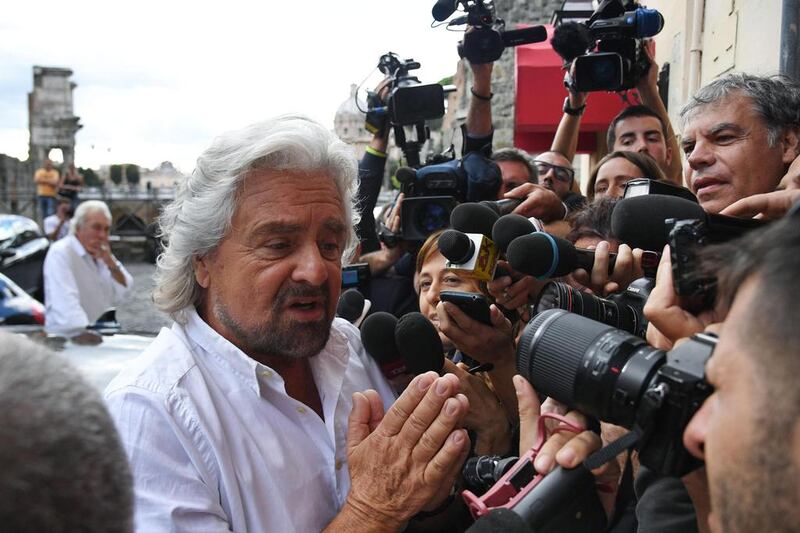In the age of populism, political accountability is the baby that has been thrown out with the bathwater.
Politicians who govern from the gut have somehow found the formula that detaches them from responsibility.
When a landmark highway bridge in Italy crashed to the ground last week, the country's own government seized on the tragedy as a political opportunity.
One of the main parties in Rome's governing coalition has long put the Morandi bridge at the heart of its agenda. The founder of the Five Star Movement party, Beppe Grillo, had rejected warnings about the safety of the structure as a "fairytale". In the wake of the collapse, however, Five Star and its partner in the Italian government have joined the outcry about official failures.
The blame game unfolding in Italy is real. So angered are the families of the dead that many refused to join the state funeral. "My son has not just died, he was killed," said a father at the first burial on Friday. "Now part of me has died."
The swirl of emotions is fertile ground for the newly empowered national leadership. Matteo Salvini, the rabble-rousing deputy prime minister, has sought to turn the disaster into an indictment of the EU's post-2008 austerity programme. Meanwhile Luigi di Maio, the Five Star leader and Mr Salvini's political partner as fellow deputy prime minister, has turned his guns on the Autostrade company that operated the bridge. Mr Di Maio declared that the business did not "pay for my election campaign" and said he was therefore free to revoke its contract.
The two amici are hardly alone in displaying blithe disregard for the normal rules of political exchange.
US President Donald Trump suffers stinging blows, from resignations to revelations of outrageous behaviour, on an almost daily basis.
Apparent disasters are often greeted as a vindication of his view that the entire Washington card table must be overturned. Alternatively he makes outrageous attempts to counter the calamities with distractions.
Meanwhile in Britain, the populists who rode the wave of the 2016 referendum to leave the EU rose to high levels of government. Some were in charge of overseeing the process. It has been ignominious. David Davis, the Brexit minister who quit this summer, always acknowledged he wasn't up to the job. He held the post so that no one more competent could do it.
Emmanuel Macron, the French president, has moderate political positions but is a populist as well. The Macron bandwagon in France rolls on, even though his reforms have not shifted the economic dial. Unemployment remains at nine per cent. A scandal over his bodyguard beating up street protesters has barely dented the mystique.
Watching an old video clip of John McCain in the US Senate provided the perfect example of the difference between taking responsibility and mere posturing. Mr McCain was for years the outlier in US politics. He was the quintessential political maverick.
In the clip, Mr McCain was introducing a draft treaty to bring Montenegro into Nato. The Arizona senator, who is now cancer-stricken, dared any senator to lodge an objection, a procedure that under Senate rules would delay the whole process.
The clip dated from March 2017. Sure enough, the populist Rand Paul, a libertarian senator, stood up and issued a one-sentence objection. Mr McCain got back to his feet and called out his colleague. Mr Paul was working for Vladimir Putin, who was opposed to the Nato project, he charged. As the other senator walked away, Mr McCain said Mr Paul's failure to justify his veto spoke volumes for the bankruptcy of his position.
Mavericks like Mr McCain are vanishing characters in public life, who offer a corrective to the populists.
That’s why a promise by the British minister in charge of the prison system last week caught my eye.
Rory Stewart is an aristocratic former diplomat who made his reputation walking across Afghanistan in late 2001. A newspaper reporter caught wind of his journey and wrote up his travels.
Mr Stewart went on to serve as a minor functionary in the post-Saddam Hussein administration headed by Paul Bremer. Switching back to Afghanistan, he worked with Hamid Karzai and Prince Charles, the heir to the British throne, to set up the Blue Mountain heritage foundation in Kabul.
Now a member of parliament and a minister, he has made a striking pledge. A series of measures he promotes is designed to cut drug-fuelled violence in 10 British prisons.
If his reforms do not work, he promises to resign within a year. He has even given a figure to measure his promise. If there is not a 25 per cent reduction in violent assaults as a result of his work, he will quit his job.
No such targets are ever forthcoming from the populists.
Instead they unleash animus against the system and that is sufficient to their cause.





